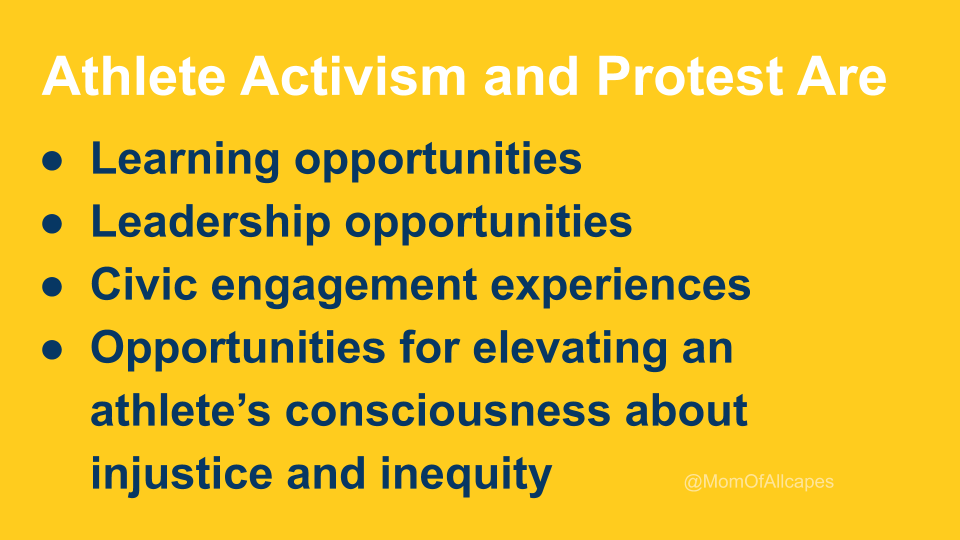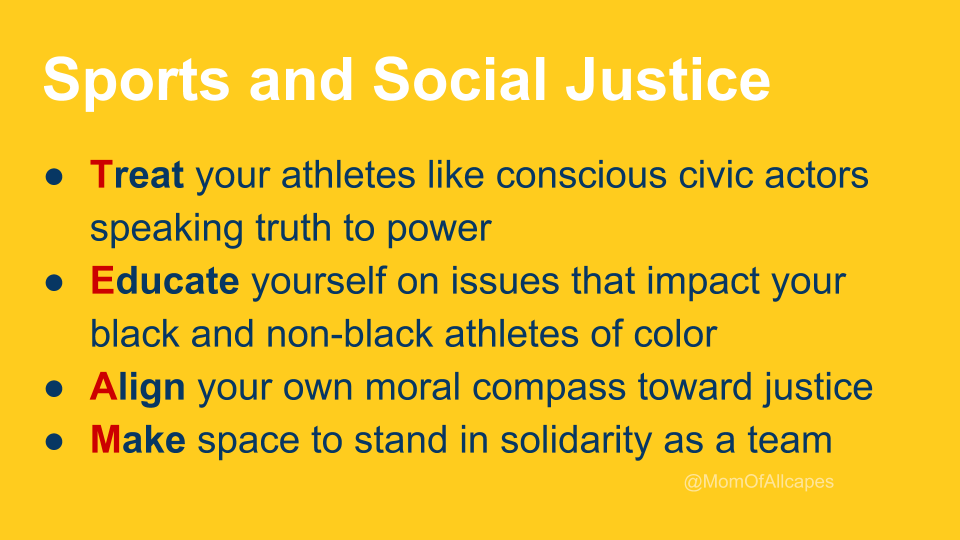Sports and Social Justice:
Supporting Youth Voice on Your Team
This toolkit provides resources to help coaches better support their athletes engaged in activism, protest, and social justice work.
|
Check back frequently for updates to links, additional information, and new resources! |
Why should we consider athlete activism, social justice, and protest, good?
Historically, athletes of all backgrounds have used their status and influence to shed light on injustice. We want youth and young adults engaged in improving the health of our society to empower them with the understanding that they can make a difference now and in the future. We want experiences that encourage youth to pursue their civic passions as an opportunity to improve the lives of those around them. We want to eliminate despair by normalizing youth and young adults to analyze inequity so that we create more just experiences for everyone.
How can coaches authentically encourage social justice and activism on their teams?
First, coaches must always stand on the side of justice. Life is unfair and people experience a variety of inequities no matter what background, but black and non-black people of color experience historic and contemporary inequities rooted in a system of preference based on race. Other systems of preference also include gender, sexual orientation, religion, class, physical ability, etc. Accepting this is the first step in supporting your athletes in their activism.
Ask yourself: Is my moral compass pointed toward justice or what I believe is right?
Ask yourself: Is my moral compass pointed toward justice or what I believe is right?
Second, coaches can engage in their own internal anti-racism work to investigate the deep inequities that exist in our society and how they impact athletes at disproportionate rates. Do the work to stamp out your own biases and what you think you know.
Ask yourself: Am I making assumptions about an athlete’s physical prowess and ability? Am I aware of power dynamics when I listen to my athletes’ concerns? Am I addressing inequitable practices on my program? Am I doing my own work to understand the history of racism nationally and internationally?
Ask yourself: Am I making assumptions about an athlete’s physical prowess and ability? Am I aware of power dynamics when I listen to my athletes’ concerns? Am I addressing inequitable practices on my program? Am I doing my own work to understand the history of racism nationally and internationally?
Third, coaches can stand in solitary to support youth in their activism and social work. One of the best ways that coaches can support youth voice is by leveraging their own power and influence in support of the social justice and anti-racist work athletes are engaged in.
Ask yourself: Who can I connect my athletes with for help? Who can I bring in to talk to my team? How can I unify the team and our supporters behind this cause?
Ask yourself: Who can I connect my athletes with for help? Who can I bring in to talk to my team? How can I unify the team and our supporters behind this cause?
How can I get started?
Knowledge is power! Below you will find links to help you get started. It is advisable to have a journey to jot down your thoughts along this process. Keep asking the hard questions of yourself and others.
Podcasts on Athlete Civic Engagement, Activism, and Social Justice
- Why Athlete Activists Matter (Edge of Sports)
- Hidden History: The Civil Rights Movement and the Black Athlete (Edge of Sports)
- Talking to Legendary Olympic Sprinter And Activist Wyomia Tyus (Edge of Sports)
- Let’s Talk About… Supporting Your Black Athletes (Let’s K12 Better podcast)
- Giving Silence A Voice (Edge of Sports)
- Dr. Bettina Love [Hip-Hop Education & Civics] (Hip-Hop Can Save America)
- The Language of Race and Sport (The End of Sport)
- #NotYourMascot (The End of Sport)
- The Sports Industrial Complex (The End of Sport)
Videos on Athlete Activism and Social Justice
- Sports Psychology 4.0: How to Help Athletes Navigate the World of Social Justice Advocacy and Activism
- Shut Up And Dribble (Showtime Docuseries)
- LeBron James discusses his docuseries “Shut Up and Dribble”
- Civil Rights Today
Articles on Athlete Activism
- Athlete Activism (TIDES - The Institute for Diversity and Ethics in Sport)
- Fear, despair, outrage, hope: Athletes open up on why they joined protests
- ‘He’s Been Our Voice’: Seattle Says Goodbye to Michael Bennett
- Black Athletes, Black Activism
- Athletes Today Have A Lot To Learn From The 1968 NYAC Boycott
- Athletes and activism: The long, defiant history of sports protests (via The Undefeated)
- Black Women Athletes, Protest, and Politics: An Interview with Amira Rose Davis (Black Perspectives)
- Athlete activism is on the rise, but so is the backlash (Global Sports Matters)
- How do you measure the impact of athlete activism? (Global Sports Matters)
- Athlete activism has global, historical aspects (Global Sports Matters)
- How the Black Power Protest at the 1968 Olympics Killed Careers (History)
- From the N.B.A., a Cautionary Tale on National Anthem Protests
Books By Athletes on Activism and Social Justice
- Things That Make White People Uncomfortable Michael Bennet and Dave Zirin
- We Matter: Athletes and Activism Etan Thomas
- Forty Million Dollar Slaves William C. Rhoden
- The Heritage - Black Athletes, A Divided America, And the Politics of Patriotism Howard Bryant
- The Revolt of the Black Athlete: 50th Anniversary Edition (Sport and Society) Harry Edwards
Tools for Helping Your Athletes in their Activism
This toolkit was created for the US Soccer Foundation © 2020


